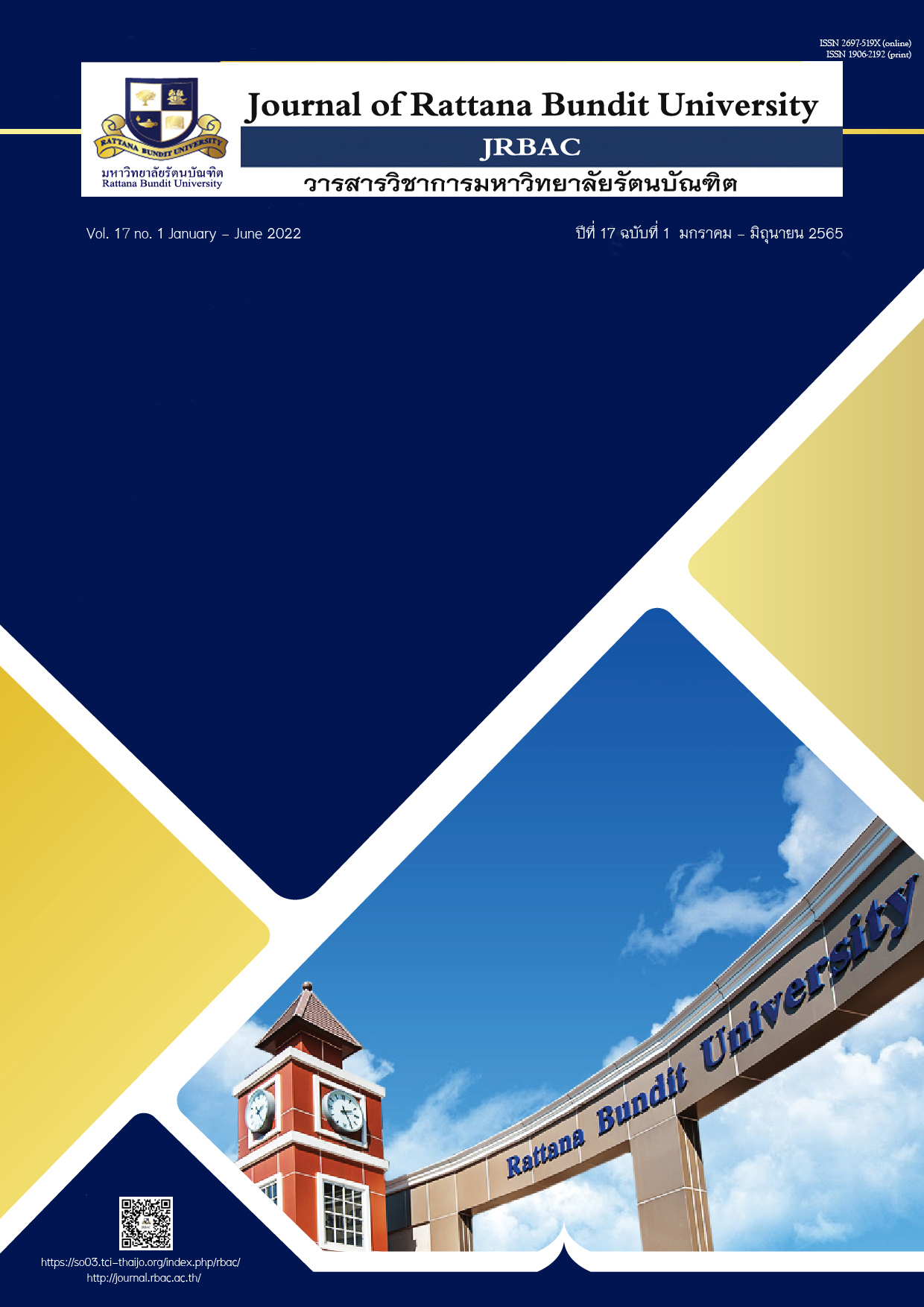การตลาดเชิงประสบการณ์ตราสินค้าที่มีอิทธิพลต่อคุณค่าของโรงแรมบูติก
Main Article Content
บทคัดย่อ
ธุรกิจโรงแรมเป็นส่วนสำคัญของอุตสาหกรรมการท่องเที่ยวไทย และมีการเติบโตอย่างต่อเนื่อง อย่างไรก็ตามยุคสมัยที่เปลี่ยนไป ผู้ประกอบการจะต้องเรียนรู้และขับเคลื่อนธุรกิจให้ทันตามเทคโนโลยีที่ให้ความสำคัญกับการใช้เทคโนโลยีปัญญาประดิษฐ์ เพื่อสร้างประสบการณ์ที่มีความเฉพาะตัว และมอบบริการที่พิเศษเหนือความคาดหมาย พร้อมทั้งเข้าใจถึงความต้องการของนักท่องเที่ยวและปรับตัวให้ทันต่อการเปลี่ยนแปลงของยุคสมัยอยู่ตลอดเวลา โรงแรมบูติกถือเป็นที่พักขนาดเล็กที่คงความเป็นเอกลักษณ์เฉพาะตัวทั้งการออกแบบสถานที่และบริการ รวมถึงกลุ่มลูกค้าจะเป็นกลุ่มที่มีความต้องการสินค้าหรือบริการอย่างใดอย่างหนึ่งเป็นพิเศษหรือเรียกว่าตลาดเฉพาะกลุ่ม (Specific Market Segment) การศึกษาบทความนี้จึงได้ศึกษาแนวคิดการตลาดเชิงประสบการณ์ แนวคิดประสบการณ์ของตราสินค้า แนวคิดการตลาดออนไลน์เชิงประสบการณ์ และแนวคิดการสร้างความเชื่อมั่นและผูกพันกับตราสินค้า เพื่อนำไปสู่แนวคิดการสร้างการรับรู้คุณค่าตราสินค้าในโรงแรมบูติก ซึ่งจะทำให้ผู้ประกอบการได้ทราบถึงการสร้างประสบการณ์ที่ดีและน่าจดจำให้กับลูกค้าทั้งรูปแบบออฟไลน์และออนไลน์ รวมไปถึงส่งมอบประสบการณ์การบริการที่แปลกใหม่และแตกต่างจากคู่แข่ง ทำให้ลูกค้าที่ได้สัมผัสประสบการณ์จากการมาใช้บริการมีความทรงจำที่ดีและบอกต่อไปยังคนที่รู้จัก ครอบครัว และสังคมอย่างเต็มใจ เกิดความประทับใจส่งผลให้ลูกค้าเกิดความจงรักภักดีต่อโรงแรมได้ในอนาคต
Article Details

อนุญาตภายใต้เงื่อนไข Creative Commons Attribution-NonCommercial-NoDerivatives 4.0 International License.
เอกสารอ้างอิง
กองยุทธศาสตร์และการวางแผนเศรษฐกิจมหภาค. (2562). ภาวะเศรษฐกิจไทยไตรมาสที่สามและแนวโน้มปี 2562–2563. https://www.nesdc.go.th/ewt_dl_link.php?nid=9618
บุ๊คกิ้งดอทคอม. (2562). คาดการณ์เทรนด์ท่องเที่ยวประจำปี 2020 ชาวไทยใส่ใจสิ่งแวดล้อม เที่ยวเมืองรองมากขึ้น. https://shorturl.asia/ZU7uw
สำนักงานเศรษฐกิจการคลัง, สำนักนโยบายเศรษฐกิจมหภาค (2564). ประมาณการเศรษฐกิจไทยปี 2564 และ 2565. https://media.thaigov.go.th/uploads/document/142/2022/01/pdf/Doc_20220128131546000000.pdf
Aaker, D. A., & Equity, M. B. (1991). Capitalizing on the value of a brand name. New York, 28(1), 35-37.
Anhar, Lucienne. (2001). The definition of boutique hotels. https://www.hospitalitynet.org/editorial/4010409.html.
Atilgan, E., Aksoy, Ş., & Akinci, S. (2005). Determinants of the brand equity: A verification approach in the beverage industry in Turkey. Marketing Intelligence & Planning, 23(3), 237-248.
Atwal, G., & Williams, A. (2009). Luxury brand marketing: The experience is everything. Journal of Brand Management, 16(5/6), 338-346.
Berry, L.L. (2000). Cultivating service brand equity. Journal of the Academy of Marketing Science, 28(1), 128-137.
Booking.com. (2019). Booking.com Forecast of travel trends for 2020, Thai people care about the environment, Travel to secondary cities more. https://shorturl.asia/ZU7uw (in Thai)
Bowden, J. L. (2009). The process of customer engagement: A conceptual framework. Journal of Marketing Theory and Practice, 17(1), 63-74.
Brakus, J.J., Schmitt, B.H., & Zarantonello, L. (2009). Brand experience: What is it? How is it measured? Does it affect loyalty?. Journal of Marketing, 73(3), 52-68.
Brodie, R. J., Ilic, A., Juric, B., & Hollebeek, L. (2013). Consumer engagement in a virtual brand community: An exploratory analysis. Journal of Business Research, 66(1), 105-114.
Burnkrant, R. E., & Unnava, H. R. (1995). Effects of self-referencing on persuasion. Journal of Consumer Research. 22(1), 17-26.
Chang, P. L. & Chieng, M. H. (2006). Building consumer-brand relationship: a cross-cultural experiential view. Psychology and Marketing, 23(11), 927-959.
Cobb-Walgren, C.J., Ruble, C.A., & Donthu, N. (1995). Brand equity, brand preference, and purchase intent. Journal of Advertising, 24(3), 25-40.
Cleff, T., Lin, I. C., & Walter, N. (2014). Can You Feel It?-The effect of brand experience on brand equity. IUP Journal of Brand Management, 11(2), 7.
Dayour, F. (2019). Backpackers’ experiences with smartphone usage in Ghana. Anatolia. 30(3), 390-403.
Ding, C. G. and Tseng, T. H. (2015). On the relationships among brand experience, hedonic emotions, and brand equity. European Journal of Marketing, 49(7/8), 994-1015.
Forgacs, G. (2003). Brand asset equilibrium in hotel management. International Journal of Contemporary Hospitality Management, 15(6), 340-242.
Fung, S. K. & King, C. (2010). When experience matters: Building and measuring hotel brand equity, the customer`s perspective. International Journal of Contemporary Hospitality Management, 22(5), 589-608.
García, J. A. C., Galindo, A. D. V., & Suárez, R. M. (2018). The effect of online and offline experiential marketing on brand equity in the hotel sector. Spanish Journal of Marketing-ESIC, 22(1), 22-41.
Ghaderi, Z., Mirzapour, M., Henderson, J. C., & Richardson, S. (2019). Corporate social responsibility and hotel performance: A view from Tehran, Iran. Tourism Management Perspectives. 29, 41-47.
Hollebeek, L. (2011a). Exploring customer brand engagement: Definition and themes. Journal of Strategic Marketing, 19(7), 555-573.
Hollebeek, L. (2011b). Demystifying customer brand engagement: Exploring the loyalty nexus. Journal of Marketing Management, 27(7-8), 785-807.
Hollebeek, L. D., Glynn, M. S. & Brodie, R.J. (2014). Consumer brand engagement in social media: Conceptualization, scale development, and validation. Journal of Interactive Marketing, 28(2), 149-165.
Hoyer, W.D., Chandy, R., Dorotic, M., Krafft, M., & Singh, S.S. (2010). Consumer co-creation in new product development. Journal of Service Research, 13(3), 283-296.
Im, H. H., Kim, S. S., Elliot, S. & Han, H. (2012). Conceptualizing destination brand equity dimensions from a consumer-based brand equity perspective. Journal of Travel & Tourism Marketing, 29(4), 385-403.
Keller, K.L. (2003). Strategic brand management: Building, measuring, and managing brand equity (2nd ed.). Englewood Cliffs, NJ.: Prentice-Hall.
Keyser, A., Lemon, K. N., Klaus, P., & Keiningham, T. L. (2015). A framework for understanding and managing the customer experience. Marketing Science Institute: working paper series, 85(1), 15-121.
Kim, D., & Perdue, R. R. (2013). The effects of cognitive, affective, and sensory attributes on hotel choice. International Journal of Hospitality Management, 35, 246-257.
Kim, H., & Kim, W. (2005). The relationship between brand equity and firms performance in luxury hotels and chain restaurants. Tourism Management, 26(4), 549-560.
Kumar, V., Aksoy, L., Donkers, B., Venkatesan, R., Wiesel, T., & Tillmanns, S. (2010). Undervalued or overvalued customers: Capturing total customer engagement value. Journal of Service Research, 13(3), 297-310.
Macroeconomic Policy Office, Fiscal Policy Office. (2021). Thai economic projections for 2021 and 2022. https://media.thaigov.go.th/uploads/document/142/2022/01/pdf/Doc_20220128131546000000.pdf (in Thai)
Macroeconomic Strategy and Planning Division. (2019). Thai economic conditions in the third quarter and outlook for 2019-2020. https://www.nesdc.go.th/ewt_dl_link.php?nid=9618 (in Thai)
Mathwick, C., Malhotra, N., & Rigdon, E. (2001). Experiential value: Conceptualization, measurement and application in the catalog and internet shopping environment. Journal of Retailing, 77(1), 39-56.
Nambisan, P., & Watt, J. (2011). Managing customer experiences in online product communities. Journal of Business Research, 64(8), 889-895.
Prasad, K., & Dev, C.S. (2000). Managing brand equity: A customer-centric framework for assessing performance. Cornell Hotel and Restaurant Quarterly, 41(3), 22-31.
Rose, S., Hair, N., & Clark, M. (2011). Online customer experience: A review of the business-to-consumer online purchase context. International Journal of Management Reviews, 13(1), 24-39.
Sabiote, E. F., & Ballester, M. E. D. (2011). Marcas de experiencia: Marcando la diferencia. Estudios Gerenciales, 27(121), 59-77.
Salehi, M., Salimi, M., & Haque, A. (2013). The impact of online customer experience on service quality in Malaysia. World Applied Sciences Journal, 21(11), 1621-1631.
Skard, S., Nysveen, H., & Pedersen, P. E. (2011). SNF Working Paper No. 09/11 Brand and customer experience in service organizations: Literature Review and Brand Experience Construct Validation.
Vivek, S. D., Beatty, S. E., & Morgan, R. M. (2012). Consumer engagement: Exploring customer relationships beyond purchase. Journal of Marketing Theory and Practice, 20(2), 127-145.
Yoo, B., & Donthu, N. (2001). Developing and validating a multidimensional consumer-based brand equity scale. Journal of business research, 52(1), 1-14.
Zarantonello, L. & Schmitt, B.H. (2010). Using the brand experience scale to profile consumers and predict consumer behavior. Journal of Brand Management, 17(7), 532-540.


